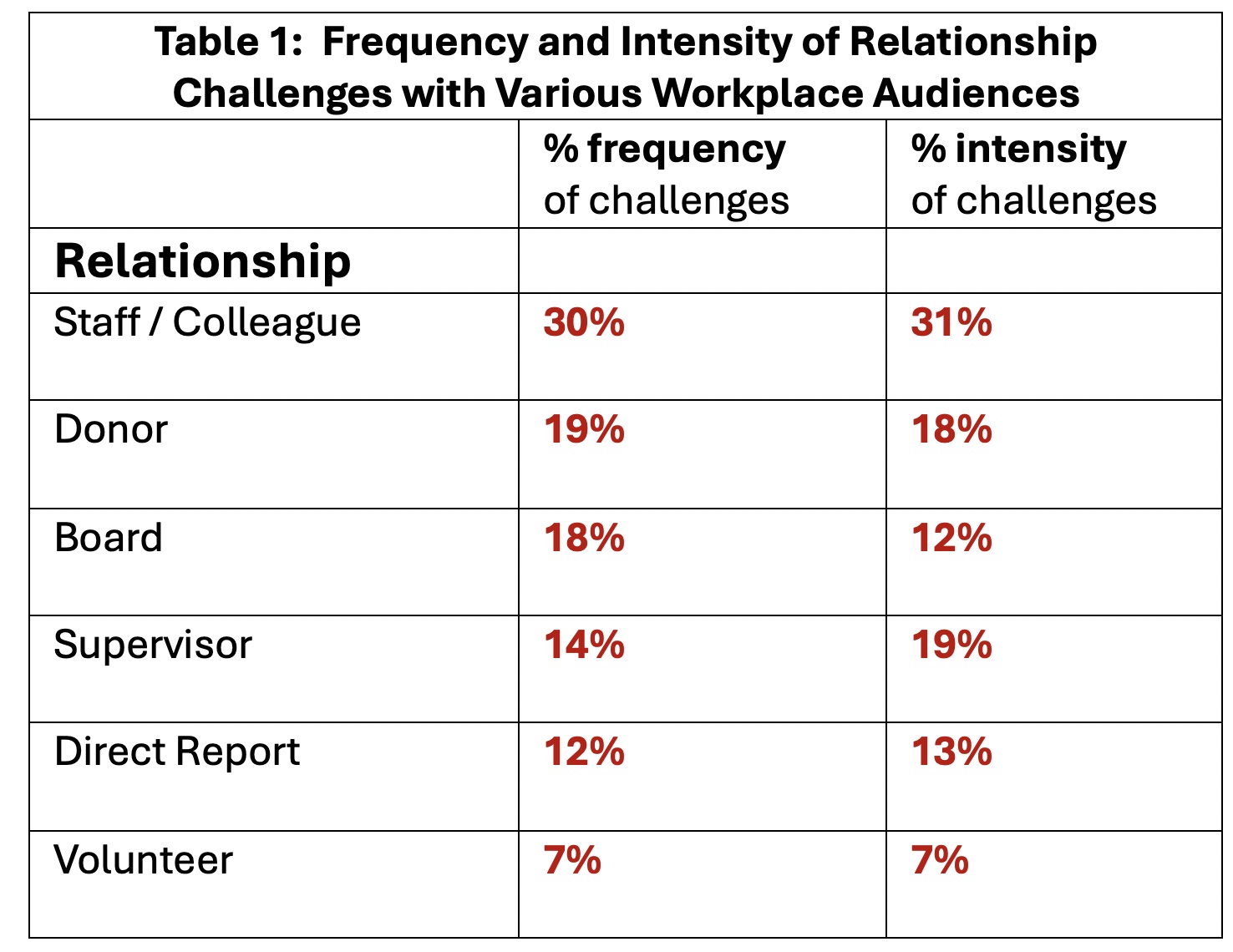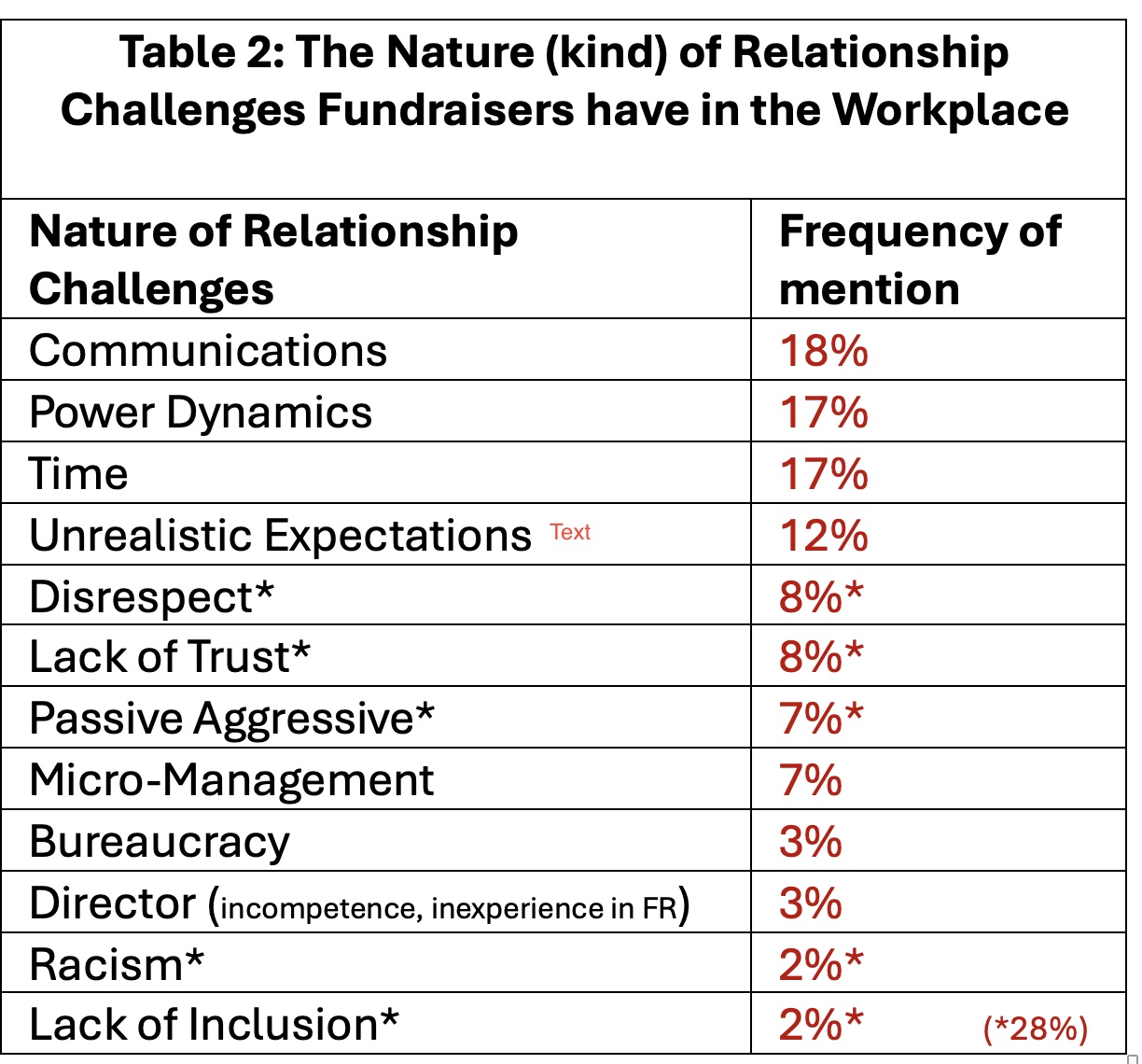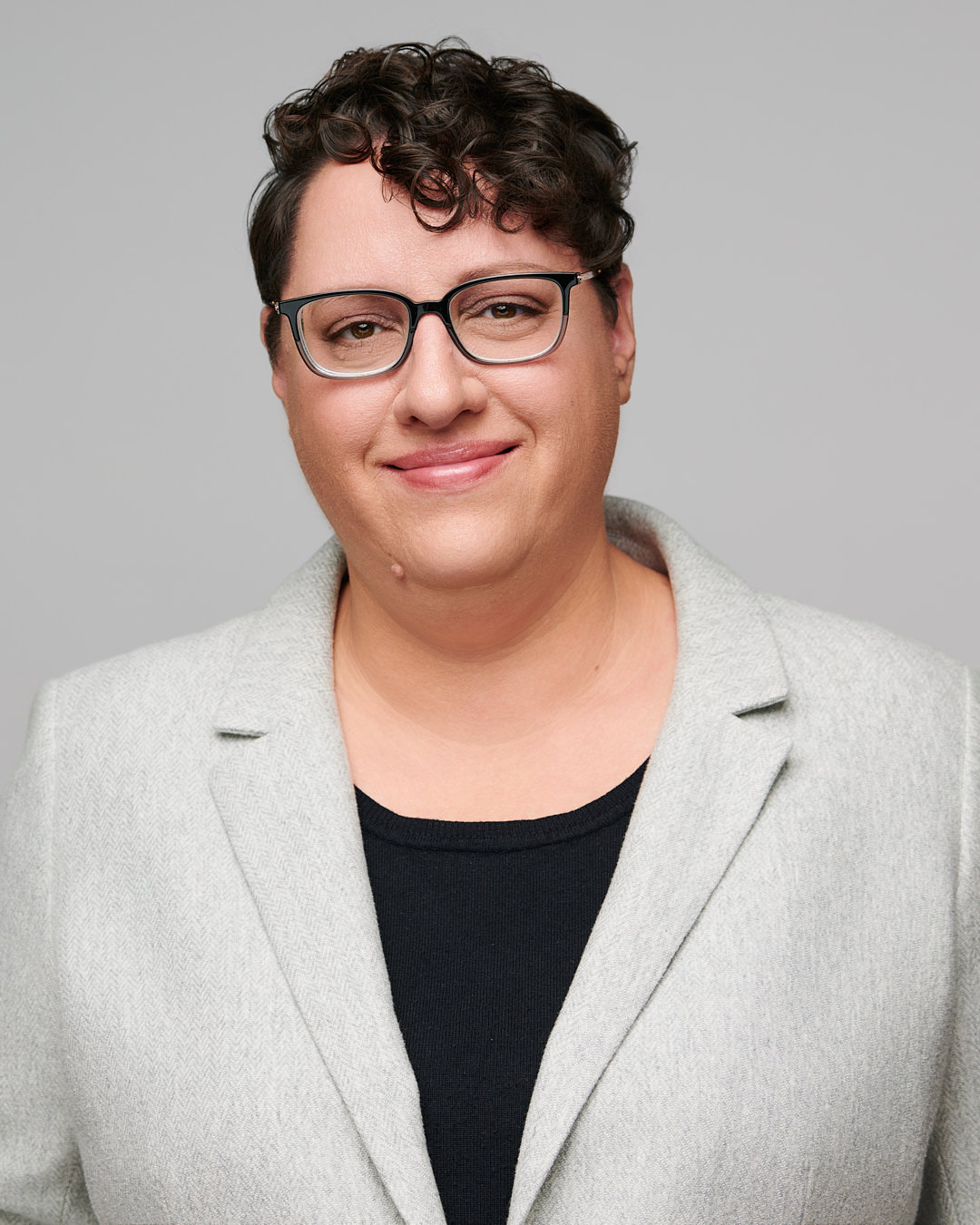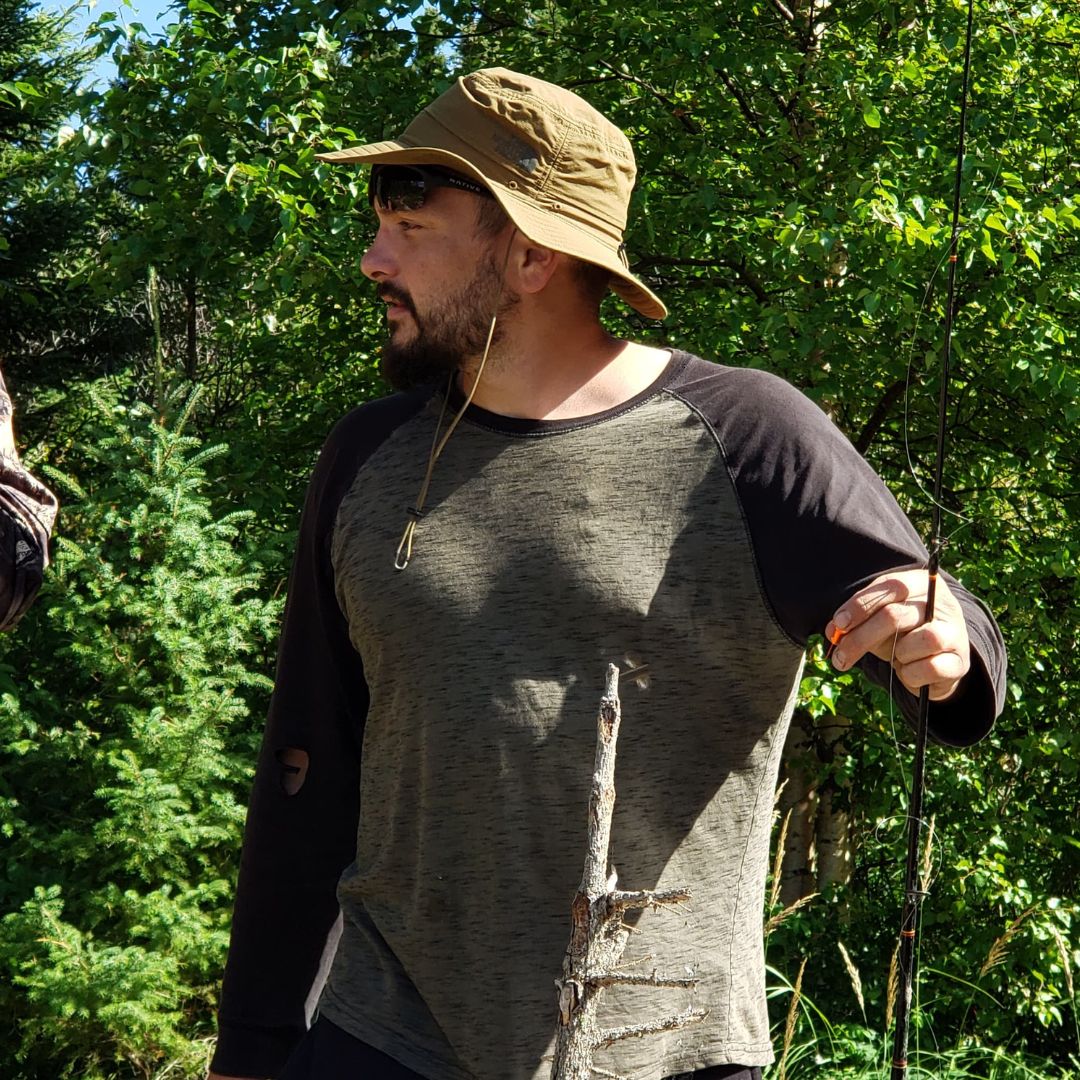- Home
- About Us
- The Team / Contact Us
- Books and Resources
- Privacy Policy
- Nonprofit Employer of Choice Award

Fundraisers know that the most challenging relationships are usually with one of three audiences: our boards, our bosses or our doners. Right? Think again!
At the Western Canada Fundraising Conference, we conducted a survey with a packed room of fundraisers, asking them about their relationship challenges. It was a three-part survey done during one of our sessions.
In the survey, we identified six major audiences we interact with on a regular basis: supervisors, boards, volunteers, direct reports, fellow staff/colleagues and donors. We asked participants to identify those audiences that —
a) they most frequently have challenges with, and
b) present them with the most intense challenges.
Thirdly, we asked about the nature of the challenges they are presented with.
We also contacted fundraisers who did not attend our session and asked what they thought fundraisers would say regarding their most challenging relationships. Their answers were what you might expect— most assumed the response would include boards, bosses and donors.
BUT the surveyed fundraisers came back with a different answer.
Fundraisers’ most challenging relationships
The fundraisers in our session told us unequivocally that the most challenging group of people to work with as fundraisers, are their very own colleagues – their fellow staff members.
When given a choice of six audiences, one in three fundraisers indicated that fellow staff members and colleagues where the most challenging people to work with.

While we often complain about the challenges we have with our boards, bosses and with other audiences we deal with, colleagues are seldom identified as being at the top of the list of those most challenging to deal with.
When it comes to the frequency of challenges, fellow staff and colleagues also top the list. And when it comes to the intensity of challenges—you guessed it. Colleagues top the list. Donors are in second place regarding frequency and bosses or supervisors are second in regards to intensity.
But what about the nature of the challenges that fundraisers are having with the various audience groups they deal with on a daily basis?
The nature of relationship challenges
Fundraisers in our session were given a list of potential challenges they may have encountered or be encountering. While responses varied, it was not surprising that “communication” was identified as the number one challenge. What we did find interesting, is that “power dynamics” scored high, and was mentioned as often as “time.”
Interesting as well was the relation between “time” and its close association with “unrealistic expectations.” When you think about it, the two go hand in hand. If fundraisers had lots of time to complete their tasks, expectations may not appear to be unrealistic.
There is so much that can be said about all of the workplace challenges named by the fundraisers and outlined in Table 2. However, those challenges normally related to human behaviour are among the most disturbing.
 Behavioural challenges
Behavioural challenges
Behaviours like “disrespect,” “lack of trust,” “passive aggressive,” as well as “racism” and “lack of inclusion” scored relatively low individually. However, if we place these same behaviours together in a single category their cumulative score is 28%. In other words, the imposition of negative behaviours represents more than one-quarter of the workplace challenges fundraisers face.
So, what does it all mean?
It could mean a lot of things, e.g. that many fundraisers are feeling stressed by power dynamics, lack of time, unrealistic expectations and poor behaviour—not only among our own colleagues—but also in broader workplace.
It could also mean that we are increasingly being called upon to be leaders in our organizations by being more assertive in describing work challenges and by educating our supervisors and boards about the challenges we face in exercising our craft. It could mean that we need to be more patient and tolerant with each other and that we need to lead by listening with compassion, understanding and empathy.
It definitely means that this is just the beginning of understanding more thoroughly what we need to do to support each other and lift up each other during times of stress and challenge so that we may successfully pursue fundraising goals on behalf of the organizations and the beneficiaries we serve.
 Tony Myers has a lifetime of experience in fundraising, organizational development, strategy, teaching, and mentoring. He is an author and executive coach working for the past 35 years with NGO leaders from more than 70 organizations on 6 continents around the world. He one of the founders of Leaders of Tomorrow Canada Foundation, the current Board chair, the founder and lead consultant with Myers & Associates as well as an associate with ViTreo Group Inc. Tony’s approach in all that he does is to listen first, seek deep understanding, identify challenges and opportunities and then finding a way to work together to realize success.
Tony Myers has a lifetime of experience in fundraising, organizational development, strategy, teaching, and mentoring. He is an author and executive coach working for the past 35 years with NGO leaders from more than 70 organizations on 6 continents around the world. He one of the founders of Leaders of Tomorrow Canada Foundation, the current Board chair, the founder and lead consultant with Myers & Associates as well as an associate with ViTreo Group Inc. Tony’s approach in all that he does is to listen first, seek deep understanding, identify challenges and opportunities and then finding a way to work together to realize success.
 Melissa Novecosky is a Certified Fundraising Executive recently taking on the role of Associate Executive Director at the Shaw Festival in Niagara-on-the-Lake, ON. Previously, Melissa spent eight incredible years fundraising for the Royal Manitoba Theatre Centre, the last four as Director of Development. A graduate of the National Theatre School of Canada, she started her career as a stage manager, where she honed her craft on over 50 productions at theaters across the country. Melissa invests her time outside of work mentoring emerging artists and building queer community.
Melissa Novecosky is a Certified Fundraising Executive recently taking on the role of Associate Executive Director at the Shaw Festival in Niagara-on-the-Lake, ON. Previously, Melissa spent eight incredible years fundraising for the Royal Manitoba Theatre Centre, the last four as Director of Development. A graduate of the National Theatre School of Canada, she started her career as a stage manager, where she honed her craft on over 50 productions at theaters across the country. Melissa invests her time outside of work mentoring emerging artists and building queer community.

Demian Lawrenchuk is the Executive Director of Food Matters Manitoba, working with his team and a vast network across Manitoba to rebuild Indigenous food systems across the north. He has committed his life to the resurgence of Indigenous culture and wellbeing within his community of Fox Lake Cree Nation and throughout the province.